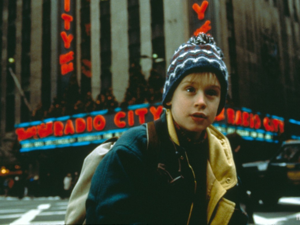These films screen at Cinema Borealis in Wicker Park • 1550 N. Milwaukee Ave, 4th Floor (NOTE: There is no elevator!)
Suggested Donation: $10
The schedule is also available through Google Calendar.
Seating is limited so please arrive early.
Sunday, September 9 @ 7:00pm and 9:15pm – Note revised start times.
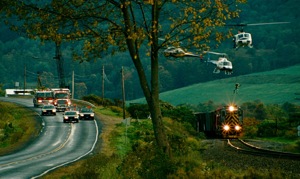 UNSTOPPABLE
UNSTOPPABLE
Directed by Tony Scott • 2010
The recent death of director/producer Tony Scott has left an irreparable rupture in Hollywood cinema: the Paul Sharits of testosterone-driven action filmmaking, Scott staged mayhem with a singularly florid intensity—color outside of time. After the operatic assault of The Hunger, Scott settled into a series of relatively staid blockbusters before an abstract late-career renaissance that encompassed Man on Fire, Domino, Deja Vu, and his final masterpiece, Unstoppable. A mere plot summary of Unstoppable makes it sounds like a Denzel-ized retread of Speed, but trust us: if your idea of a perfect night at the movies is watching trains hurdle through the verdant backwoods of Pennsylvania at a hundred miles per hour in throbbing primary shades, this is your kind of movie. One of the rare recent action films to take full advantage of the scope of Cinemascope, Unstoppable also found praise in the Canadian journal Cinemascope for its “daring, forceful plunges into abstraction combined with a hardscrabble, working-class metaphysics.” (KW)
98 min • 20th Century Fox • 35mm from Criterion Pictures, USA
Sunday, September 16 @ 7:00pm
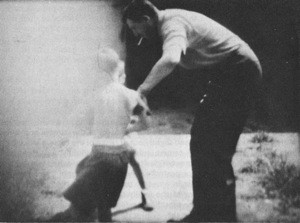 HOME MOVIES AND THE AVANT-GARDE – PROGRAM 1
HOME MOVIES AND THE AVANT-GARDE – PROGRAM 1
For decades, home movies and avant-garde films were jointly denigrated as ‘amateur’ in the least appealing sense: precious, obscure, endless, and immeasurably handicapped by a lack of professional polish. They were judged as failed attempts at Hollywood-style filmmaking, though their aspirations and implications often could not be more removed. In the 1960s, avant-garde filmmakers like Jonas Mekas and Stan Vanderbeek began reclaiming the epithet of ‘home moviemakers,’ producing work that challenged the borders of amateur cinema and domesticity itself. In honor of the tenth anniversary of Home Movie Day, the Northwest Chicago Film Society will be screening two programs of avant-garde films that exalt, appropriate, and reshuffle home movies. Co-sponsored by Chicago Film Archives. (KW)
The Program
People Near Here (Ron Finne, 1969, 12 min, 16mm from Film-makers’ Coop)
Urban Peasants (Ken Jacobs, 1975, 60 min, 16mm from Film-makers’ Coop)
Shit Rat (Dave Rodriguez, 2012, 20 min, 16mm from the artist)
Sunday, September 30 @ 6:00pm & 8:30pm
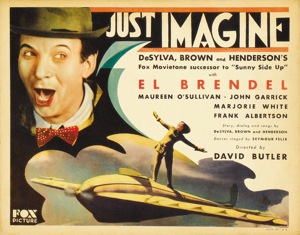 JUST IMAGINE
JUST IMAGINE
Directed by David Butler • 1930
A lavish science fiction musical from a band of Broadway braggarts with largely nominal interest in the rockets and biotech innovations depicted herein, Just Imagine is nothing if not a singular cinematic experience. In this speculative rendition of 1980, citizens are identified only by alphanumeric codes and love is regulated through the government marriage tribunal. (It plays equally well as a show-stopper for 1930 and a Tea Party fever dream for 2012.) When aristocratic dead weight MT-3 wins a marriage judgment for the hand of LN-18 (Maureen O’Sullivan), her sweetheart J-21 (John Garrick) must undertake an experimental trip to Mars to prove his social worth. He’s joined by Single O (El Brendel), a lightning victim from “the good ol’ days” of 1930 recently revived by the miracle of modern science. (As an instantly perishable artifact of 1930, El Brendel’s dumb Swede vaudeville shtick can’t be bettered.) With its inimitable blend of creditable Art Deco set design, a varied score from De Sylva, Brown, and Henderson (Good News, Sunnyside Up), and a terrifyingly guttural cohort of Martian chorines, Just Imagine leaves nothing to the imagination. (KW)
109 min. • Fox Film Corp. • 35mm from Criterion Pictures, USA
Sunday, October 14 @ 7:00pm
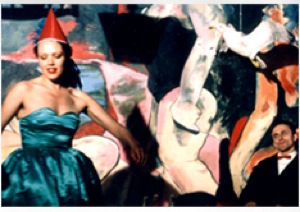 HOME MOVIES AND THE AVANT-GARDE – PROGRAM 2
HOME MOVIES AND THE AVANT-GARDE – PROGRAM 2
For decades, home movies and avant-garde films were jointly denigrated as ‘amateur’ in the least appealing sense: precious, obscure, endless, and immeasurably handicapped by a lack of professional polish. They were judged as failed attempts at Hollywood-style filmmaking, though their aspirations and implications often could not be more removed. In the 1960s, avant-garde filmmakers like Jonas Mekas and Stan Vanderbeek began reclaiming the epithet of ‘home moviemakers,’ producing work that challenged the borders of amateur cinema and domesticity itself. In honor of the tenth anniversary of Home Movie Day, the Northwest Chicago Film Society will be screening two programs of avant-garde films that exalt, appropriate, and reshuffle home movies. Co-sponsored by Chicago Film Archives. (KW)
The Program
The Persistence of Memory (Ricardo Block, 1984, 16.5 min, 16mm from Filmmaker’s Coop)
A Trip to the Land of Knowledge (Zoe Beloff, 1995, 65 min, 16mm from Filmmaker’s Coop)
Reflexfilm/Familyfilm (Dana Hodgdon, 1978, 22 min, 16mm from Chicago Filmmakers)
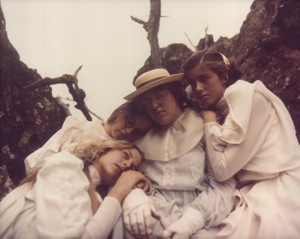 Sunday, October 28th @ 6:00pm & 8:30pm
Sunday, October 28th @ 6:00pm & 8:30pm
PICNIC AT HANGING ROCK
Directed by Peter Weir • 1975
Better known in the US for more straightforward projects like Dead Poet’s Society and The Truman Show, Peter Weir led the Australian New Wave almost single-handedly with The Cars That Eat People, The Last Wave, and this film about three teenage schoolgirls and their schoolmistress who disappear at Hanging Rock. Echoing the adolescent tension and repression of Lindsay Anderson’s If…., Hanging Rock is similarly able to feel real and unreal, and Weir’s sense of minimalism (so unsellable it caused an American distributor to throw a coffee cup at the screen) doesn’t give any clues or comfort. Like Nicholas Roeg in Walkabout, Weir painted Australia as a land of mystery until Crocodile Dundee blew it all out of the water: the score sounds like a jet engine that may never take off, the camera’s lens is masked in a thin wedding veil and often washed out by the sun, and the girls will be lost forever. (JA)
107 min • The Australian Film Commission • 35mm from Janus Films
Sunday, November 11th @ 6:00pm & 8:30pm
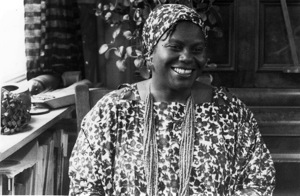 YOU GOT TO MOVE: STORIES OF CHANGE IN THE SOUTH
YOU GOT TO MOVE: STORIES OF CHANGE IN THE SOUTH
Directed by Lucy Massie Phenix and Veronica Selver • 1985
“What is it that changes people from feeling powerless to making them see and feel their own power in bringing about changes that will affect their lives?” You Got to Move began with this question and found ample and inspiring answers from a half dozen Southerners allied with the Highlander Folk School in rural Tennessee. The documentary commemorates three generation of political activists whose achievements would become marginalized in the Reaganite ’80s, including Sweet Honey in the Rock frontwoman Berenice Reagon and Highlander co-founder Myles Horton. Produced by engaged documentary veterans Phenix and Selver, who also contributed to Winter Soldier, Word is Out, The Life and Times of Rosie the Riveter, and Berkeley in the Sixties. (KW)
85 min • 16mm from Milliarium Zero • Co-presented with portoluz
Former Chicago Reader critic and Highlander alumnus Jonathan Rosenbaum will introduce the 8:30 show and lead a discussion afterwards.
Sunday, November 18th @ 6:00pm & 8:00pm
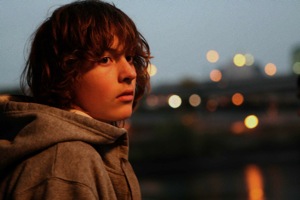 PARANOID PARK
PARANOID PARK
Directed by Gus van Sant • 2007
A beautifully jumbled document of adolescent anxiety, Paranoid Park is Gus van Sant’s post-punk/dream pop after-school special. High schooler Alex should be flirting with girls or holding forth on the Iraq War, but his only engagement with the world comes as a liberated skateboarder in Paranoid Park. When a disfigured corpse turns up in the rail yard next door, a local cop begins profiling local skaters and prompts a moral crisis for a kid who didn’t know he could have one. Cast almost exclusively through the Myspace profiles of Portland-area teenagers, Paranoid Park assays a wholly singular sense of otherworldly emotional realism and vulnerability. Building upon the major achievements of Elephant and Last Days, Gus van Sant confirms his reputation as America’s queerest popular filmmaker. Financed with French money and barely screened in the US, Paranoid Park is one of the essential and forward-looking films of the new century. (KW)
84 min • MK2 • 35mm from IFC
Sunday, December 2nd @ 7:00pm – Note revised start time
THE ANIMATION OF WLADYSLAW STAREWICZ
Wladyslaw Starewicz • 1912-1934
The inexplicably creepy stop motion films of 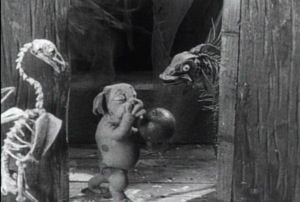 Russian born natural historian Wladyslaw Starewicz left a mark on animation as strong as Walt Disney or the Fleischer Brothers, influencing everyone from Jan Svankmajer to Terry Gilliam, but where other animators seemed to cull their material from the land of the living, Starewicz’s feel like they’ve been dug out of the ground (and they are, basically). The result is an extremely unsettling palette of dead bugs, taxidermied animals, skeletons, and rear projected real world backgrounds blended into something that predicts the work of Salvador Dali, George A. Romero, and Mister Ed the talking horse. Several prints in this program have been provided by animation historian and archivist Tom Stathes. Visit him at Cartoons on Film and the Bray Animation Project. (JA)
Russian born natural historian Wladyslaw Starewicz left a mark on animation as strong as Walt Disney or the Fleischer Brothers, influencing everyone from Jan Svankmajer to Terry Gilliam, but where other animators seemed to cull their material from the land of the living, Starewicz’s feel like they’ve been dug out of the ground (and they are, basically). The result is an extremely unsettling palette of dead bugs, taxidermied animals, skeletons, and rear projected real world backgrounds blended into something that predicts the work of Salvador Dali, George A. Romero, and Mister Ed the talking horse. Several prints in this program have been provided by animation historian and archivist Tom Stathes. Visit him at Cartoons on Film and the Bray Animation Project. (JA)
The Program
The Revenge of a Kinematograph Cameraman (1912, 12 min, 16mm)
The Frogs Who Wanted A King (1922, 9 min, 16mm)
The Voice of the Nightingale (1925, 13 min, 16mm)
The Town Rat and the Country Rat (1927, 10 min, 16mm)
The Mascot (1934, 26 min, 16mm)
Sunday, December 16th @ 6:00pm and 8:30pm
HOME ALONE 2: LOST IN NEW YORK
Directed by Christopher Columbus • 1992
Accidentally abandoned by his family on Christmas in New York, Macaulay Culkin fends for himself against the Wet Bandits Harry & Marv. The miracle of Dolby Stereo brings an uncomfortable reality to the twisting of limbs, crunching of bones, and pulling of hair that Jules White never could have dreamed of, but the joke is that Lost In New York is the purest film Chicago native John Hughes ever put his name on. Where Ferris Bueller’s Day Off hides a thoughtless, mean-spirited agenda behind budding yuppie Matthew Broderick, Home Alone 2 is honestly manipulative, forthright, noble, and actually quite sweet. Look out for Eddie Bracken, who provides half of the moral backbone of the film as the owner of Duncan’s Toy Chest, better known to Chicagoans as the Rookery Building on 209 South LaSalle St. This special 20th Anniversary screening will be presented in an original 35mm 1992 release print from our own collection. (JA)
120 min • 20th Century Fox • 35mm from Radio Cinema Film Archive, Permission Criterion Pictures, USA

